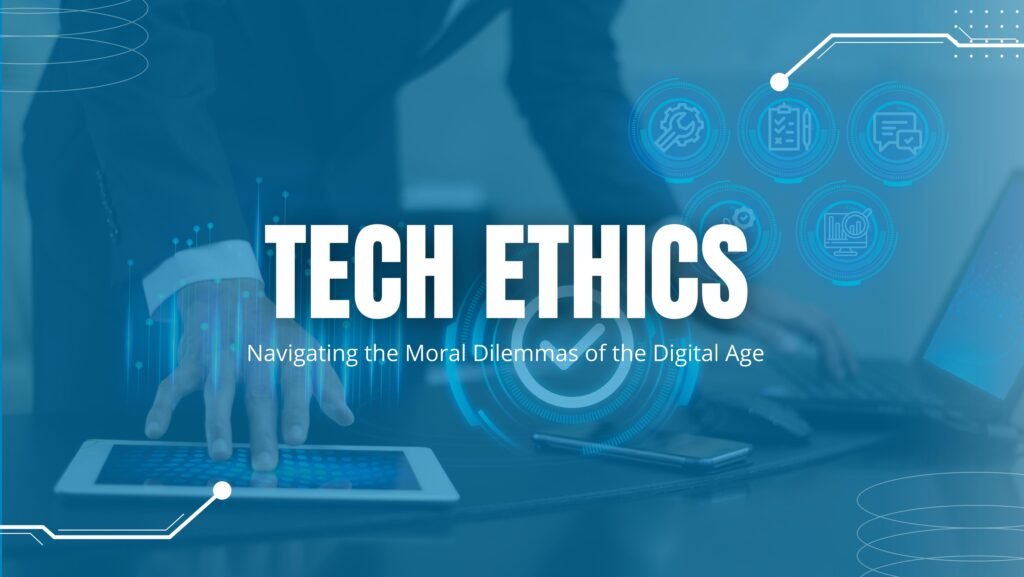Imagine this: you wake up, reach for your smartphone, and instantly connect to a world teeming with technological wonders. But in this digital age, have you ever stopped to ask yourself, “What’s the price we pay for our tech-driven lives?” Or perhaps, “How do we ensure that the technologies we create are in harmony with our values and ethics?”
Tech ethics is all about the rules and principles that guide how we make, use, and understand technology in our society. It’s like a roadmap that helps us figure out if the new tech stuff we create is good, fair, and safe for everyone. As we keep charging ahead into the digital age, tech ethics reminds us to think about the moral impact of what we’re doing.
The Importance of Tech Ethics in the Digital Age
Our lives are becoming more and more intertwined with technology. From our smartphones and social media to self-driving cars, artificial intelligence, and the internet of things, these innovations have not only changed how we live but have also raised many important ethical questions. We’re standing at a critical point where we need to address issues like privacy, fairness, safety, and the well-being of society.
“Ethics has been well called the religion of Science”—Edwin Grant Conklin
Tech ethics plays a crucial role in helping us navigate these challenges. It acts as a protective shield against the potential problems and unexpected consequences that come with these groundbreaking technologies. It also guides us in making choices that respect people’s rights, preserve human dignity, and benefit society as a whole. In essence, it helps us find a balance between progress and our core values.
The Digital Age’s Moral Dilemmas
In our digital world, we face some tricky ethical problems. These are situations where technology, our values, and how it affects society all come together. Here are few big ones:
- Privacy Concerns
Think about how your personal information gets collected and how that might feel like someone is watching you. Is that okay?
In today’s digital world, personal data is a highly sought-after commodity. Every time you use a smartphone, browse the internet, or engage with social media, your data is collected and often shared with various entities, sometimes without your knowledge or consent.
This raises significant concerns about privacy. It’s essential to consider who has access to your data and how it’s used.
Tech ethics plays a crucial role in determining the boundaries of data collection, ensuring that your personal information is handled with care and respect.
In this online world, where do we draw the line on what’s private and what’s not?
The concept of privacy is evolving rapidly in the digital age. Unlike the physical world, the boundaries of privacy online are not always clear.
What you share on social media, for instance, can have far-reaching consequences. Tech ethics encourages us to reflect on how we navigate this digital landscape, understanding that privacy is not only about what you keep secret but also about controlling who has access to your personal information.
- Algorithmic Bias
Algorithms are like smart programs that make decisions. But sometimes, they make unfair choices. How does that affect us?
Algorithms are like decision-making tools used in various aspects of our lives, from job recruitment to lending and law enforcement.
However, these algorithms can sometimes exhibit bias, meaning they make unfair or prejudiced decisions. This can happen when the data used to train these algorithms is itself biased.
Tech ethics pushes us to recognize this issue, understand how it occurs, and address it. By doing so, we can ensure that algorithms make decisions that are fair and just for everyone. When algorithms make biased choices, it can hurt people in real life. It’s important to understand how this works.
When algorithms display bias, it can lead to real-world consequences. For example, biased algorithms in hiring can perpetuate inequalities, and biased criminal justice algorithms can lead to unfair sentencing. Recognizing these impacts is an essential part of tech ethics.
- Artificial Intelligence and Job Displacement
Imagine if robots took over a lot of jobs. What happens to the people who used to do those jobs? This is a big deal.
As artificial intelligence (AI) and automation technologies advance, they have the potential to automate many jobs. While this can lead to increased efficiency, it also raises concerns about job displacement.
Tech ethics emphasizes the importance of considering the societal implications of AI-driven automation.
It calls for a balanced approach where we explore ways to create new job opportunities, retrain the workforce, and ensure that everyone benefits from technological progress.
We need to think about the fairness of using AI to replace jobs and how to help people find new work.
Tech ethics encourages us to think about how we can mitigate the negative impacts on individuals and communities. This may involve policies to support displaced workers, investment in education and upskilling programs, and guidelines for responsible automation that consider its societal impact.
- Cyberthreats
There are bad people on the internet trying to steal our information. How do we protect ourselves from them?
In the digital age, cyber threats are on the rise. These threats encompass various forms of malicious activities, such as hacking, data breaches, and cyber-attacks.
Individuals, organizations, and governments are all potential targets. Tech ethics acknowledges the importance of cybersecurity and the need to protect digital infrastructure.
It also highlights the potential consequences of cyber threats, such as the theft of sensitive information, financial losses, and damage to critical infrastructure.
The Role of Education and Awareness
The role of education and awareness in tech ethics is paramount. It begins with integrating tech ethics into educational programs, fostering a generation of ethical decision-makers.
Ethical tech advocacy at both individual and organizational levels, along with strong digital literacy, can drive lasting change in the tech industry and promote a culture of responsible technology use. Here are the few things we can do about it:
- Tech ethics should be integrated into educational programs, from K-12 to higher education, to ensure that students develop a strong foundation in ethical decision-making in the digital age.
- Offering tech professionals and employees in the tech industry ongoing training in ethics helps them make ethical choices in their work.
- The media, including news outlets and social media, should contribute to public awareness by covering tech ethics stories and fostering discussions.
- Nonprofits and advocacy groups play a vital role in raising awareness of tech ethics issues through campaigns, educational initiatives, and public events.
- Local communities can organize workshops, seminars, and discussions on tech ethics to engage citizens in ethical decision-making regarding technology.
Ethical awareness helps prevent the misuse of technology, protecting individuals and society from unethical tech practices.
Educational initiatives and increased public awareness of tech ethics are critical components in ensuring that the digital age is marked by ethical choices, responsible practices, and positive societal impacts.
Conclusion:
In today’s digital era, tech ethics is the North Star guiding our path. It reminds us to tread carefully, considering the ethical implications of every technological leap. By integrating education and fostering awareness, we pave the way for a responsible digital future, where innovation aligns with ethics, ensuring a more equitable and careful tech landscape.







